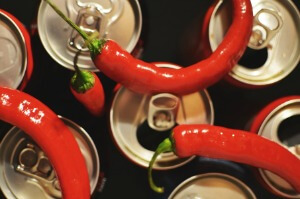Feeling the Burn? What Causes Heartburn in Men?
 You asked for it, and you got it! A nice lady at church told me, “My husband has heartburn and keeps hoping it will go away. He won’t go to the doctor, and he doesn’t know anything about what he should do. He needs very basic information.”
You asked for it, and you got it! A nice lady at church told me, “My husband has heartburn and keeps hoping it will go away. He won’t go to the doctor, and he doesn’t know anything about what he should do. He needs very basic information.”
So, this is part of an occasional series of very basic stuff that you should know about your body. We’ll start with heartburn. A lot of men have frequent heartburn, and either take something for the symptoms or tough it out, and neither approach is ideal. If you are having a lot of heartburn, you should talk to a doctor, ideally a gastroenterologist, a doctor who specializes in the digestive tract. You may be treating it the wrong way. If you’re ignoring it, you should know that untreated heartburn can lead to a very bad situation called Barrett’s esophagus — which is treatable, but which can lead to cancer if it’s not addressed.
Heartburn 101
I hate heartburn. It’s a burning in your esophagus, a fire in the chest, pain that, if it’s really bad, can make you think you’re having a heart attack. It can affect the throat, too. This is called throatburn (the medical name is “laryngopharyngeal reflux”), and it can make you cough and need to clear your throat a lot, can make your voice hoarse, even make it harder to swallow.
Just about everybody gets heartburn sometimes. But if you have it more than twice a week, then what you call this miserable condition should probably change to GERD — gastroesophageal reflux disease.
What is it?
Basically, the problem is a leaky valve. When you eat, food goes down your esophagus and into the stomach. There is a stopper — a muscle that’s supposed to clench like a fist after food gets into the stomach — called the Lower Esophageal Sphincter (LES). In a lot of us, it doesn’t always work right. This is bad because stomach acid, also called gastric acid, is very powerful. It’s made up of hydrochloric acid, potassium chloride, and sodium chloride, and its job is to activate digestive enzymes, so they can start breaking down the proteins in what you just ate. Think of Coke taking the tarnish off a penny: stomach acid just works away, breaking down hamburgers and pizza and biscuits and gravy and apples and beer and cereal and salad. That’s usually not a problem in the stomach, because the stomach is equipped to handle all that acid. But the esophagus and throat are not protected from that spillover — so it’s like holding a hot pan without an oven mitt. Not pleasant.
Why doesn’t my dang valve work?
“There are three major reasons why people reflux,” says University of Virginia gastroenterologist Mark Worthington, M.D. (Disclaimer: I happen to be married to Mark, an excellent, caring physician.)
One reason: Transient (temporary) lower esophageal relaxations, “where the lower esophageal sphincter winks open,” just like it does when you burp, “and it bathes the lower esophagus in acid.” The acid may never go all the way up to the throat; in fact, “some people don’t think they have reflux because they don’t taste acid,” Worthington says. People with this problem have a normal valve; it just doesn’t function properly.
Two: Hiatal hernia. That’s where the junction between the stomach and esophagus is stretched, so that it no longer functions properly. The valve itself is abnormal. Have you ever heard of a dunlop? As in, “my gut dunlopped over my belt?” Well, in this case, there’s a tiny “dunlop” in which a little piece of your stomach pokes upward into the chest. By itself, a hiatal hernia is not a worrisome thing; a lot of us have it. But it can contribute to GERD.
The last big reason: Extra poundage: Speaking of dunlops, if you want your heartburn to get better and you don’t want to take medicine forever, lose a few pounds. It’s that darn belly fat again. Using a few thousand patients from the Nurses’ Health Study, a massive long-term study of more than 238,000 nurses, Harvard physicians studied the link between Body Mass Index and symptoms of GERD; their work was published in the New England Journal of Medicine in 2006. They found that women who gained just a few pounds had more frequent and severe symptoms of GERD. The problem with excess weight around the gut — as opposed to extra weight elsewhere, as in thunder thighs or junk in the trunk — is that it pushes on the stomach, causing more pressure in there. Very simply, this is a mechanical problem. More pressure on the LES forces some of that stomach acid out and upward. Now, there’s a flip side to every statistic, and the good news here is that even losing a little bit of weight is going to take some of that pressure off and make your symptoms better. “You can make reflux better by losing weight, often as little as 10 pounds,” Worthington says.
Here are some other factors:
The luck of the genetic draw: GERD has a genetic component. It is known to run in families. Now, you may say that in a lot of families, everybody eats the same food, so no wonder they all have it, and that’s a good point. But there still seems to be an inherited tendency to GERD, so if a parent or sibling has it, you might have it, too. A hiatal hernia can also be hereditary.
Tobacco: In addition to everything else bad that smoking does, it makes GERD worse. When you smoke, your mouth produces less spit — and saliva helps buffer that awful acid from your stomach. Nicotine also seems to relax the Lower Esophageal Sphincter — it causes that fist to unclench. And, if you cough a lot from smoking, that can cause acid to shoot upward, as well. Chewing tobacco, because it has nicotine, is going to have that same effect of relaxing the LES.
Stress: Stress makes heartburn worse. It’s not clear why; it may be that it makes you more sensitive to stomach acid, so even a little goes a long way to making you feel bad. Also, when you’re stressed, you make fewer prostaglandins, chemicals that help protect against stomach acid.
Eating like a pig: Yes, I could have put it more delicately. But I don’t judge; we’ve all done it. Two things here: One, when you pig out, it causes more pressure on the stomach, which puts more pressure on that valve, which can open and send acid into the esophagus and throat. Two, you know it, I know it: Chances are, when you’re scarfing down food, it’s not broccoli and kale. The kind of foods that people tend to overeat — comfort foods, high in fat or oils — are known to relax the valve. Chili, cheesesteaks, pizza, burgers, lasagna, fried chicken, cheese puffs, onion rings, etc. Also, garlic, chocolate, alcohol, coffee, citrus fruit, and tomatoes can trigger GERD.
Tight clothing: Loosen your belt, and you may feel better. It takes the pressure off the belly — which, in turn, takes pressure off that pesky valve.
Don’t miss the next article on what you can do to make heartburn better! Sign up below to get it in your mailbox.
In addition to the book, I have written about prostate cancer on the Prostate Cancer Foundation’s website, pcf.org. The stories I’ve written are under the categories, “Understanding Prostate Cancer,” and “For Patients.” I firmly believe that knowledge is power. Saving your life may start with you going to the doctor and knowing the right questions to ask. I hope all men will put prostate cancer on their radar. Get a baseline PSA blood test in your early 40s, and if you are of African descent, or if cancer and/or prostate cancer runs in your family, you need to be screened regularly for the disease. Many doctors don’t do this, so it’s up to you to ask for it.
©Janet Farrar Worthington





Leave a Reply
Want to join the discussion?Feel free to contribute!